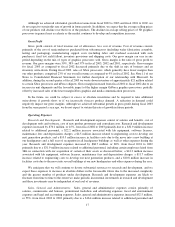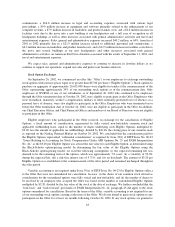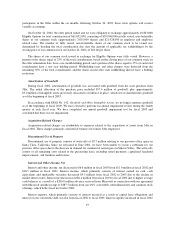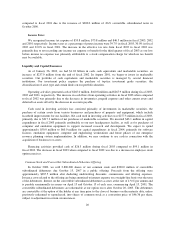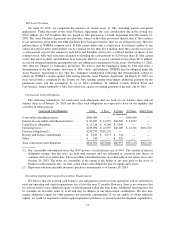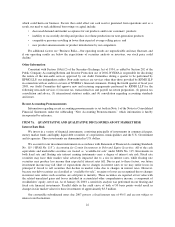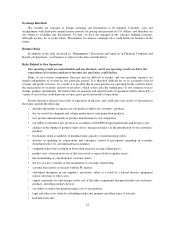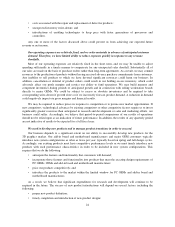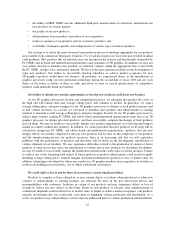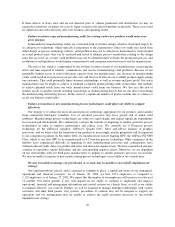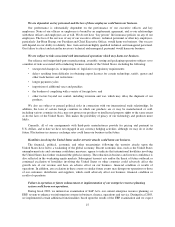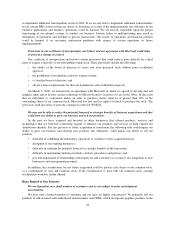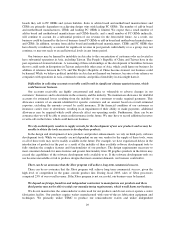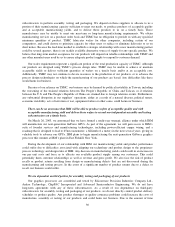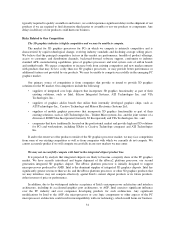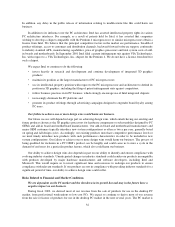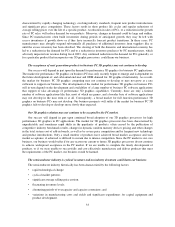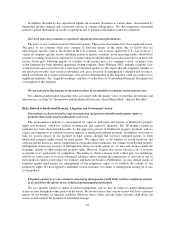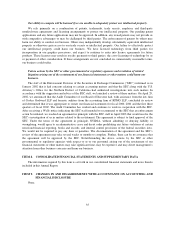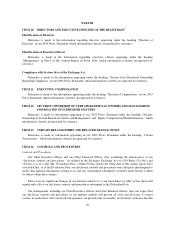NVIDIA 2003 Annual Report Download - page 29
Download and view the complete annual report
Please find page 29 of the 2003 NVIDIA annual report below. You can navigate through the pages in the report by either clicking on the pages listed below, or by using the keyword search tool below to find specific information within the annual report.We are dependent on key personnel and the loss of these employees could harm our business.
Our performance is substantially dependent on the performance of our executive officers and key
employees. None of our officers or employees is bound by an employment agreement, and so our relationships
with these officers and employees are at will. We do not have “key person” life insurance policies on any of our
employees. The loss of the services of any of our executive officers, technical personnel or other key employees,
particularly Jen-Hsun Huang, our President and Chief Executive Officer, would harm our business. Our success
will depend on our ability to identify, hire, train and retain highly qualified technical and managerial personnel.
Our failure to attract and retain the necessary technical and managerial personnel would harm our business.
We are subject to risks associated with international operations which may harm our business.
Our reliance on foreign third-party manufacturing, assembly, testing and packaging operations subjects us to
a number of risks associated with conducting business outside of the United States, including the following:
• unexpected changes in, or impositions of, legislative or regulatory requirements;
• delays resulting from difficulty in obtaining export licenses for certain technology, tariffs, quotas and
other trade barriers and restrictions;
• longer payment cycles;
• imposition of additional taxes and penalties;
• the burdens of complying with a variety of foreign laws; and
• other factors beyond our control, including terrorism and war, which may delay the shipment of our
products.
We also are subject to general political risks in connection with our international trade relationships. In
addition, the laws of certain foreign countries in which our products are or may be manufactured or sold,
including various countries in Asia, may not protect our products or intellectual property rights to the same extent
as do the laws of the United States. This makes the possibility of piracy of our technology and products more
likely.
Currently, all of our arrangements with third-party manufacturers provide for pricing and payment in
U.S. dollars, and to date we have not engaged in any currency hedging activities, although we may do so in the
future. Fluctuations in currency exchange rates could harm our business in the future.
Hostilities involving the United States and/or terrorist attacks could harm our business.
The financial, political, economic and other uncertainties following the terrorist attacks upon the
United States have led to a weakening of the global economy. Recent economic data, such as the United States
unemployment rate and consumer confidence measures, appear to indicate that international hostilities involving
the United States has further weakened the global economy. The reduction in business and investor confidence is
also reflected in the weakening equity markets. Subsequent terrorist acts and/or the threat of future outbreak or
continued escalation of hostilities involving the United States or other countries could adversely affect the
growth rate of our revenue and have an adverse effect on our business, financial condition or results of
operations. In addition, any escalation in these events or similar future events may disrupt our operations or those
of our customers, distributors and suppliers, which could adversely affect our business, financial condition or
results of operations.
Failure in operation or future enhancement or implementation of our enterprise resource planning
system could harm our operations.
During fiscal 2003, we initiated an examination of SAP A.G., our current enterprise resource planning, or
ERP, system to enhance our information systems in business, finance, operations and service. During fiscal 2003,
we implemented certain additional functionalities based upon the results of the ERP examination and we expect
27


